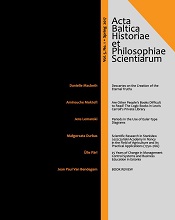Scientific Research in Stanisław Leszczyński Academy in Nancy in the Field of Agriculture and Its Practical Applications (1750–766)
Scientific Research in Stanisław Leszczyński Academy in Nancy in the Field of Agriculture and Its Practical Applications (1750–766)
Author(s): Małgorzata DurbasSubject(s): History, Agriculture, Economic history, History of ideas, Social history, 18th Century
Published by: Tallinna Tehnikaülikooli õiguse instituut
Keywords: academies; agriculture; Lorraine; scientific research; scientific societies;Stanisław Leszczyński;
Summary/Abstract: Scientific societies and academies, which represented the path to knowledge and the way of constructing theoretical sciences, constituted a distinctive feature of the intellectual life in mid-eighteenth-century Europe.These societies worked towards knowledge—in its broad sense—within the country and towards the cooperation of scholars to exchange scientific achievements and introduce technical innovations into practice. T he Royal Society in Nancy (Société Royale des Sciences et Belles Lettres), now called the Stanisław Academy, established in 1750, started research in various topics in the field of agriculture. They focused on methods of improving soil efficiency and the use of modernised farming machines in Lorraine and Bar. King Stanisław Leszczyński, founder of the institution, took great care in academic research activities, encouraging researchers to hold public speeches, advising and searching for novelties in a field, such as, for example,a new species of grass from England. He considered agriculture the driving force in the development of societies and believed that an increase in farming production would benefit common wealth. He used many innovations in his properties to underline the importance of work in agriculture and popularise various kinds of novelties.
Journal: Acta Baltica Historiae et Philosophiae Scientiarum
- Issue Year: 5/2017
- Issue No: 1
- Page Range: 70-80
- Page Count: 11
- Language: English

